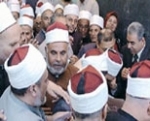08 February 2006
Iowa Imam THREATENS SUICIDE ATTACKS
 Offensive cartoons of the prophet Muhammad tempt outrage, Iowa Muslims said Monday, but the religious leaders condemned the violence that continued Monday in protests around the world.
Offensive cartoons of the prophet Muhammad tempt outrage, Iowa Muslims said Monday, but the religious leaders condemned the violence that continued Monday in protests around the world.
"Muhammad and Allah are more valuable to us than our own lives, the lives of our children, mothers and fathers," said Imam Ibrahim Dremali
of the Des Moines Islamic Center. "So when someone comes along and publishes those pictures, they must know what they are doing. They are testing Muslims, trying to see what we will do, how we will react. It is an insult to the prophet, God, Muslims, Islam, the Quran and all humanity."
Demonstrators on Monday hurled stones and firebombs at the Danish Embassy in Tehran, Iran. Two hundred student demonstrators threw stones at the Austrian Embassy. In Afghanistan, troops shot and killed four protesters as they tried to storm a U.S. military base outside Bagram.
Ahmed Souaiaia, a University of Iowa assistant professor in religious studies who teaches an introduction to Islam course, said the cartoons, published in European newspapers, communicate the idea that all Muslims are violent.
Souaiaia pointed specifically to one of the caricatures, which depicts Muhammad wearing a bomb for a turban.
"The message is that Islam is inherently violent since its founder is someone who taught violence," Souaiaia said. "Such a message does not distinguish between the various facets of Islam, a religion that is so diverse to be stereotyped by reductionist cartoons like the ones published."
The cartoons were first published in September in Denmark. The latest round of violent protests, aimed at Western embassies, was sparked by the reprinting of the images this month by French, Norwegian and Austrian papers.
"It is OK to protest. We must protest," said Cyma Saeed of Ames. "But we must peacefully march and must petition the government. It is wrong to hurt someone else because of what one newspaper has done."
Muslim leaders from Des Moines and Ames last weekend released a statement decrying publication of the cartoons. They asked for empathy and compassion in exercising freedom of the press, but strongly condemned the violence that the cartoons have spawned.
"I support the boycott of Danish products, but there is no excuse for violence," said Dremali, one of the imams who signed the statement. "The rioting and violence are forbidden in Islam."
Souaiaia said he doesn't believe violence is an appropriate response to the cartoons. However, he said his judgment - from someone informed of the values of democracy, freedom of speech and expression - does not reflect the way the issue is perceived in the Muslim world.
Few American news outlets have chosen to publish the pictures. People who have wanted to see the cartoons have generally had to search for them online.
Kathleen Carroll, executive editor of the Associated Press, explained in a statement that the cartoons don't meet the media organization's long-held standards.
"We don't distribute content that is known to be offensive, with rare exceptions," Carroll said. "This is not one of those exceptions. We made the decision in December and have looked at the issue again this week and reaffirmed that decision not to distribute."
Carolyn Washburn, editor of The Des Moines Register, said the newspaper probably could have gotten permission to reprint the cartoons if it wished. However, she said the intent is not to spread any perceived insults or stereotypes.
"The point is that some Muslims are offended by them," Washburn said. "I think that people need to apply their own faith tradition to this debate and ask themselves how they would feel if hurtful, stereotypical images of someone important in their faith tradition - Jesus Christ or Buddha - were also shown in an offensive way."
Kathleen Richardson, assistant professor of journalism at Drake University, said part of journalism ethics is being sensitive to readers. She said the cartoons of Muhammad amount to hate speech.
"How many mass media outlets would run cartoons that portrayed Jesus Christ in a bad light?" asked Richardson, who's also executive secretary of the Iowa Freedom of Information Council."
When Mohamad Khan , imam for the Muslim Community Center of Des Moines, learned the publication of the cartoons, he was filled with dread.
"When it first came out, some of the European press were making a lot of fun out of it," Khan said. "I knew it would cause great anger and that if there wasn't an apology, the people would show their outrage."
Elvedin Sivac, spokesman for the Islamic and Cultural Center Bosniak, said that in Islam, the "face of the prophet" has never been revealed to the people.
"As apostles, we believe that Muhammad was the finest person on Earth and that Allah chose Muhammad as his prophet," Sivac said. "We also believe that a person cannot draw pictures of God or the prophet without diminishing his power."
Souaiaia agreed that for Sunni Muslims, any rendition of the prophet's image is highly undesirable. For some, it is prohibited for theological reasons. However, he said not all Muslims are against the depiction of the prophet.
The Associated Press contributed to this report.
09:30 Posted in UNITED STATES | Permalink | Comments (1) | ![]() Facebook |
Facebook |



















Comments
Behold the Peace of Islam...
Posted by: Slavomir | 08 February 2006
The comments are closed.